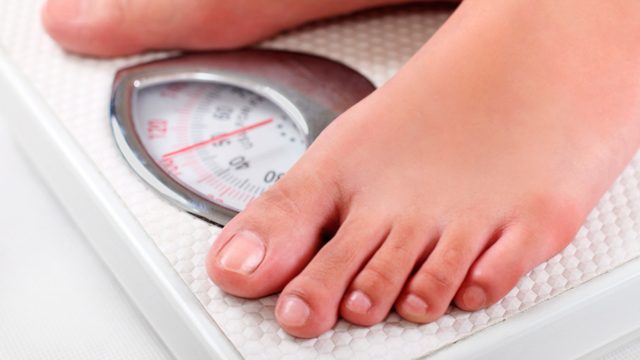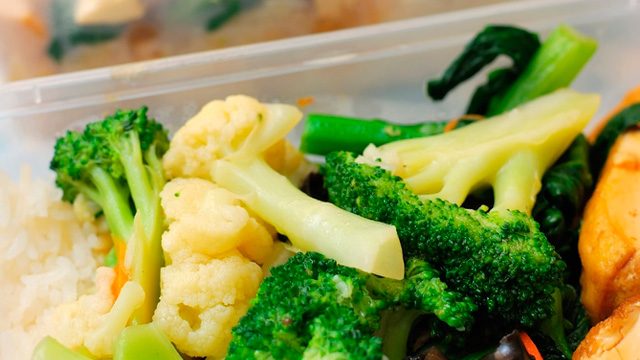SUMMARY
This is AI generated summarization, which may have errors. For context, always refer to the full article.

MANILA, Philippines – With beach season in full swing and June weddings just around the corner, many people are looking for ways to shed excess pounds and fat—fast.
One of the more popular weight-loss programs out in the market is the Cohen diet, developed by cardiologist-turned-obstetrician Dr. Rami Cohen based on his research on obesity and infertility.
(READ: Delivered diets: weight loss plan, wellness alternative)
Local celebrities Judy Ann Santos and Bea Alonzo are said to have gone on the Cohen program to lose weight quickly. Meanwhile, a March press event by the Cohen Lifestyle Centre (CLC) in the Philippines shared testimonials by clients who have lost up to 165 lbs. in 10 months through the program.
How it works
According to the CLC website, Dr. Cohen’s research led him to conclude “that obesity is a ‘disease’… a medical condition arising out of a hormonal imbalance.” Cohen believes that “obesity or being overweight has nothing to do with a lack of self-discipline but is a metabolic problem” involving three main hormones: insulin, serotonin, and the human growth hormone.
The program starts with a blood test and an analysis of an individual’s blood, liver, and kidney profiles. A personalized (and restrictive) eating plan is prescribed based on this analysis, in order to “restore balance” in a patient’s metabolism.
The entire program lasts for 6 months, throughout which a client undergoes a total of four blood tests, monthly weigh-ins, and regular consultations with the Cohen Lifestyle Centre’s medical consultants.
Exercise is restricted to very light exercise, as calorie intake is severely restricted and food needs to be weighed, measured, and cooked exactly according to one’s personalized eating plan. Eating out is discouraged as you are “unsure of how food is prepared and what ingredients are used” in restaurants.
Not for everyone
Spokespersons warn, however, that the program is “not for everyone.” According to Regina Chuavon, a director of CLC in the Philippines, “Not everyone can undergo the Cohen program. At the Centre, we do a comprehensive medical screening and coordinate with [participants’] primary physicians to see if our clients are suitable to do Cohen. Additionally, we monitor our client’s progress and blood parameters monthly so they can be guided accordingly.”
(READ: Swap out junk food for these 5 healthy snacks at work)
Entertainment executive Roger Rosales, who had undergone cranial surgery and radiation therapy for brain cancer prior to joining the Cohen program, had to wait a month before getting to go-signal from his doctor and CLC Philippines. He is “cancer-free,” and due to the lifestyle plan, has since lost 90 lbs. in seven months.
According to media executive Joy Marcelo, who lost around 40 lbs. on the program in 2012, the Cohen diet may not be suitable for people who are frequently “on the go,” as they will find it difficult to prepare their food and properly store their meals.
Those who are under 15 and over 62 years old, pregnant, lactating, diabetic, vegan, and with cardiovascular conditions are likewise disallowed from joining the program.
(READ: The diet of the stars)
Stories of success

Aside from Rosales and Marcelo, other clients of CLC in the Philippines talked about the impact of the lifestyle plan.
Erika Avancena, a now-petite girl sporting a fresh pixie cut, disclosed that she weighed 232 lbs. in 2013. Her eyes welled up as she recalled how she was unable to keep pace with her young son, being unable to bend down to tie shoelaces and getting back pains for simply climbing up the stairs. She also talked about “the [unfriendly] stares you get from people whenever you enter a store.”
“I thought the only way I could lose weight was… through invasive surgery. It dawned on me that I was really unhappy,” Avancena confessed.
She signed up for the Cohen program in 2013 and lost a total of 104 lbs.
Meanwhile, petrochemical executive Gerry Francia recalled having shortness of breath, as well as the pain in his knees and heels, that he would get from simply walking prior to losing weight. After participating in the Cohen program, he lost 165 lbs. in 10 months.
(READ: The diet and lifestyle for your blood type)
A number of Cohen clients also spoke of the ripple effect that their diet had on their families, especially on their children who now “love vegetables” as a result of seeing their parents eat more greens.

Mixed reviews
In spite of the success stories attributable to the Cohen program, it continues to receive mixed reviews due to a number of factors.
For one, the cost of the program is quite prohibitive at P60,000 for the 6-month program (excluding the blood tests, the digital food scale required to measure one’s food, multivitamins, and the food itself).
Joy Marcelo shared that, while on the Cohen program, her personal monthly grocery bill amounted to as much as P20,000—excluding groceries for her family. “Because I could eat only a limited amount of meat—and sirloin and tenderloin cuts were allowed—I got myself the best cuts of steak so that I won’t feel like I’m depriving myself.”
“You have to have extra money,” she admitted.
Dr. Bandola, however, countered this by saying that other fat-loss procedures can cost as much as P500,000. Meanwhile, maintenance medicines needed for diabetes and other lifestyle diseases can cost as much as P20,000-30,000 a month—much more than the P60,000 “investment” that the Cohen program entails.
But others have also criticized the program for being “unsustainable,” with some clients gaining the weight back (“and then some”) during the “refeeding” part of the program.
Marcelo talked about how a friend of hers had indulged a bit too much after going on the Cohen program and gained some of the weight back. However, she also pointed out that “you can always go back to the program” and lose the weight again.
“It’s a lifestyle—not a diet,” Marcelo stressed.
The food can also be cumbersome to prepare. According to “RD”, a bank officer who agreed to share information on condition of anonymity, said that you need to “make sure there’s someone who will prepare the food for you if you’re not used to cooking for yourself.” She also admitted that the most difficult part of the program was “getting tired of what I was eating.”
Entrepreneur Digzylou Umali, who lost 65 lbs. in 2010 and went “from size 12 to size 0,” shared otherwise. “With Cohen, you are given an option to create your own menu and prepare your own food using a variety of vegetables, fruits, seasonings, and meat listed in the Cohen book. It taught me how to eat healthy and eat right.”
CLC Philippines CEO Barbara Young also warned the public about the proliferation of “fake Cohen” programs and diet packages, stressing that the real program requires blood tests, personalized eating plans developed by Dr. Cohen himself, and the strict monitoring of patients’ medical histories. It is not for everyone and is not meant to be a “cookie-cutter” program.
“It’s quite unsafe [to take just any meal that advertises itself to be a ‘Cohen’ meal],” Young emphasized. “There are many enterprising individuals out there who can take advantage of this.”
Medical experts weigh in
Aside from the Cohen program, many other “rapid weight-loss” programs have drawn flak for being severely restrictive and imbalanced, and for endangering people’s health in the long run.
In February 2013, the French Agency for Food, Environmental and Occupational Health & Safety (ANSES) released a report on 15 of the most popular diets, including: “the Atkins Diet, the Sonoma Diet (Dr. Guttersen), the Lemon Detox Diet, the Chrononutrition Diet (Dr. Delabos), the 1st Personal Diet (Dr. Cohen), the Dukan Diet, the High Speed Diet (Dr. Fricker), the Mayo Clinic Diet, the South Beach Diet (Dr. Agatston), the Montignac Diet, the Ornish Diet, the Scarsdale Diet (Dr. Tarnower), the Cabbage Soup Diet, the WeightWatchers Diet, [and] the Zone Diet (Dr. Sears).”
The report cited long-term health risks in general, saying, “Some weight-loss diets may result in nutritional imbalances, specifically: excess protein and salt intake, insufficient intake of fibre, iron, magnesium and vitamin D. These imbalances can lead to health problems.”
Moreover: “One of the major recurring effects of food deprivation and exclusion, irrespective of the diet, is paradoxically weight regain, or even overweight: the more an individual diets, the greater the propensity for weight regain, leading to a yo-yo effect, particularly if the person is not physically active.”
In its conclusion and recommendation, ANSES stated: “Attempts to lose weight by dieting are only justified if motivated by health reasons and these practices must only be followed under specialist medical monitoring by a nutritionist or dietician, medical practitioners who are able to determine which diet is best suited to the specific characteristics of each patient.”
What works for one – isn’t necessarily for all
Both the directors of CLC Philippines and their clients have pointed out what works for one may not work for others. For them, a personalized, medically supervised approach to health, nutrition, and wellness is what matters most.
Some of them also spoke of the need to maintain an enjoyable exercise regimen after the “refeeding” phase, in order to maintain the benefits of the Cohen program.
Joy Marcelo, who now goes to Zumba classes three times a week and who has even gone below her ideal body weight two years after the Cohen program, shared, “This is not just about losing weight; it’s about looking good, feeling good, and being well.”
So, to Cohen or not to Cohen? Whatever your health and lifestyle goals may be, make sure that decisions you make are based on an honest assessment of your priorities, proper consultation with licensed medical professionals, and the support of those who matter most to you. – Rappler.com
Photos of packed lunch, vegatables, and weighing scale from Shutterstock; these are not photos of food from the Cohen eating plans
Add a comment
How does this make you feel?
There are no comments yet. Add your comment to start the conversation.